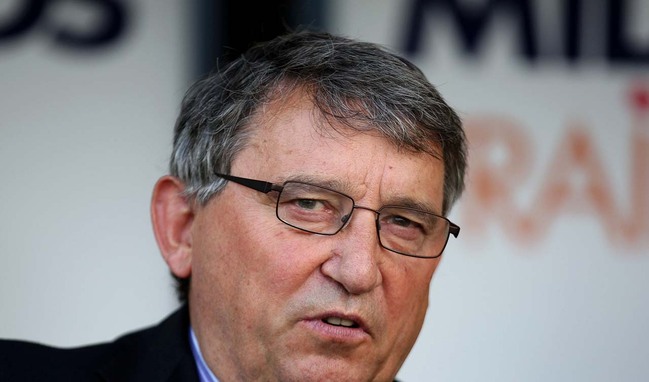
Graham Taylor OBE
Coaching Sessions

Possession and scoring
Biography
Graham Taylor OBE is particularly remembered for being manager of the England national football team, as well as being manager of Watford, a club he took from the Fourth Division to the First within five years, then from the foot of the second division to the Premier League in two seasons, two decades later. In 1982/83 the club finished second in the league behind Liverpool, earning them a place in the UEFA Cup and in ’84, he led Watford to an FA Cup Final. Taylor had totally transformed the club in the space of five years. Taylor, who passed away in 2017 aged 72, was the first President of the LMA when he became England manager. He was one of the most well respected and well-known faces in English football and it was his vision and hard work that prompted the formation of the LMA during his spell as national team boss. Graham came out of managerial retirement to take charge of Aston Villa for the second time on February 5 2002, nearly 11-and-a-half years after leaving Villa Park to become England manager.He had returned to the club as a non-executive director the previous summer after apparently ending his managerial career at Watford but was persuaded by the Villa board to sign a two-and-a-half year contract to succeed John Gregory as the club's manager. Having been appointed as manager of Watford Football Club in 1977 by Hornets Chairman Elton John, Graham Taylor went on to become one of the longest serving and most successful managers in League football.He returned to Vicarage Road nine years after leaving Watford to become manager of Aston Villa for the first time, and teamed up once more with Chairman Sir Elton John. It was a career that started with Lincoln City after Taylor was forced to retire from playing due to injury. He had played for Grimsby for six years before moving to Lincoln in 1968, taking up the managerial reins in 1972 aged just 28. In 1975/76 he led them to the Fourth Division Championship with the team scoring a record breaking 111 goals. The following season saw Lincoln finish in a very creditable 9th place in Division Three and the Watford chairman was alerted to the potential of the young manager. Taylor chose move back into Division Four to join Watford, impressed by his famous new chairman's vision for the future of the club.It was an inspired decision. Watford were promoted as Champions in his first season in charge and they went on to win promotion to Division Two the following season. After two seasons of consolidation, Taylor took The Hornets into the First Division for the first time in their history. The next season, 1982/83, saw them finish second in the league behind Liverpool, earning them a place in the UEFA Cup. Taylor had totally transformed the club in the space of five years.In 1984, Watford were unlucky to finish runners-up for another domestic trophy, this time losing out to Liverpool's neighbours Everton in the FA Cup final.Like Elton John before him, Aston Villa chairman Doug Ellis recognized Taylor's obvious abilities and after guiding Watford to top-half finishes in the league for the next three seasons, Taylor decided to take up a new challenge at Villa Park with a club that had just been relegated from the top division. He immediately returned the club to Division One and after keeping Villa up the following season, just, he was again beaten to the league title by Liverpool. His achievements had not gone unnoticed by the FA, who were looking for a successor to Bobby Robson to manage the national team. After the 1990 World Cup, where Robson had led the team to the semi-finals, Taylor was given the honour of managing England. After the 1992 European Championships and subsequent failure to qualify for the 1994 World Cup Taylor resigned. After a short break from the game, Taylor returned to management with Wolves and was hopeful, once again, of guiding another club to the top flight in English football. He was unlucky to miss out on promotion after taking Wolves into the play-offs after just two months at the helm but following a disappointing season in 1995/96, Taylor was sacked and left Molineux feeling extremely frustrated that he had not been given more time to turn things round. He returned to Vicarage Road in February 1996 but was unable to prevent Watford from being relegated to Division Two. However, he was able to rebuild the team once again and he led The Hornets back to Division One in 1997/98 and achieved a successive promotion with a dramatic play-off win in 1998/99, taking Watford into the top division once more. Taylor stayed at Watford for a further year, serving his 1,000th league game as a manager in January 2001, before handing the reins over to Gianluca Vialli and retiring from club management.He remained in 'retirement' for just 8 months and having returned to Aston Villa as a non-executive director, he resumed his role as Villa boss for one last stint in the hot-seat. In the history of Association Football, only five managers have guided the same club from the lowest division, to the highest rung of the game; Dave Bowen with Northampton Town, Taylor with Watford, John Toshack with Swansea, Dave Bassett with Wimbledon and Eddie Howe with AFC Bournemouth.
Since 2010 Elite Soccer has given subscribers exclusive insight into the training ground practices of the world’s best coaches. Published in partnership with the League Managers Association we have unparalleled access to the leading lights in the English leagues, as well as a host of international managers.
Elite Soccer exclusively features sessions written by the coaches themselves. There are no observed sessions and no sessions “in the style of”, just first-hand advice delivered direct to you from the coach.